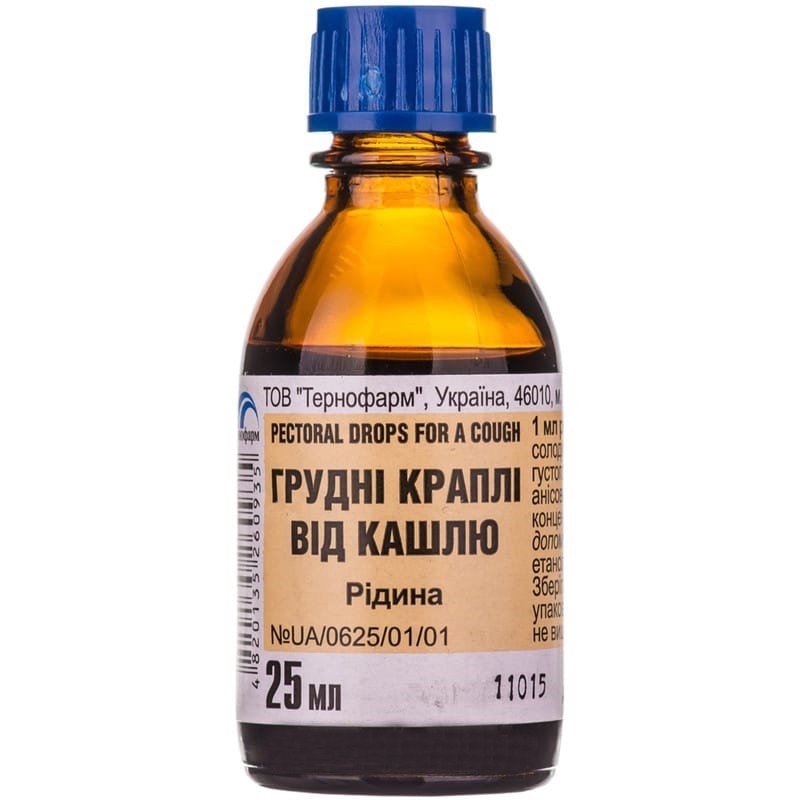



 Secure and encrypted payment processing
Secure and encrypted payment processing We ship to over 40 countries including the USA, UK, Europe, Australia and Japan
We ship to over 40 countries including the USA, UK, Europe, Australia and Japan Guaranteed refund or reship if you haven't received your order
Guaranteed refund or reship if you haven't received your orderActive ingredients: 1 ml of liquid contains licorice root of a thick extract (glycyrrhizae radix extractum spissum) (2.75: 1) (extractant - purified water) - 207 mg; aniseed oils - 3.4 mg; concentrated ammonia solution - 13.8 mg;
excipients: ethanol 90%, purified water.
Liquid.
Basic physical and chemical properties: brown liquid, with the smell of ammonia and anise oil. During storage, sediment is allowed.
Means used for cough and colds. expectorants.
ATX code R05C A10.
Pharmacodynamics
Combined drug with expectorant and anti-inflammatory effect. The substances that make up the drug stimulate the secretory function of the mucous membranes of the upper respiratory tract, thin the sputum and contribute to its coughing. Breast drops soften a dry, unproductive cough.
Pharmacokinetics
Not studied.
In the complex treatment of acute and chronic respiratory diseases, accompanied by difficult sputum production.
Impaired liver and kidney function, arterial hypertension, hypokalemia, severe obesity. hypersensitivity to the components of the drug.
Hypokalemia (as a result of excessive use of licorice root) may intensify when interacting with cardiac glycosides, antiarrhythmic drugs, and drugs that affect heart rate (e.g., quinidine). when used together with drugs that predetermine the development of hypokalemia (thiazide and looped diuretics, adrenocorticosteroids and laxatives), there may be an electrolyte imbalance, therefore, the drug with the above drugs should not be used for a long time.
Thermopsis, marshmallow, and other expectorant drugs enhance the therapeutic effect of the drug.
It is not advisable to take along with antibiotics, derivatives of the nitrofuran series.
The simultaneous use of other drugs containing ethanol should be avoided.
With the simultaneous use of any other medicines, you should consult your doctor.
It is not recommended to use the drug for a long time, as this can lead to a violation of water-salt metabolism, edema.
When storing the drug, sediment formation is possible, does not lead to a decrease in its effectiveness. Before using the drug, the vial must be shaken.
This medicine contains at least 14% ethanol (alcohol), i.e. 69–138 mg / dose (20–40 drops), which is equivalent to 1.8–3.6 ml of beer, 0.7–1.4 ml of wine per dose.
Harmful to patients with alcoholism. Care should be taken when used by pregnant and lactating women, children, patients with liver diseases and patients with epilepsy.
When using the drug should refrain from drinking alcohol.
The drug contains ethanol! The use of the drug for a long time is not recommended.
The drug is contraindicated in women during pregnancy and lactation, since the composition of the drug includes ethyl alcohol and thick licorice root extract (the latter increases estrogen levels, as a result of which hormonal balance is disturbed). stimulates uterine activity. in large doses in the experiment carries out an embryotoxic effect.
If you need to take the drug while breastfeeding, for the period of treatment, breastfeeding should be discontinued.
During the treatment period, you should refrain from driving vehicles and work requiring increased attention and a quick reaction.
Take 20–40 drops by mouth 3-4 times a day. take the drug 30 minutes before or 1 hour after a meal, after dissolving it in a small amount of liquid. the duration of the course of treatment is determined by the doctor individually.
Since the composition of the drug includes ethyl alcohol, it should not be used for children under 12 years of age.
In case of an overdose, an increase in the manifestations of adverse reactions is possible; prolonged use of licorice in excessive doses can lead to the development of hypokalemia; in some cases, hypokalemic myopathy and myoglobinuria are possible. cases of overdose have not yet been reported.
From the immune system: allergic reactions, including hyperemia, rash, itching, swelling, bronchospasm.
From the gastrointestinal tract: nausea, vomiting.
Neurological disorders: sometimes short excitement is possible, and then depression of the central nervous system, hypokalemic myopathy.
Metabolism, metabolism: in excessive doses, it can cause a violation of the water-electrolyte balance and lead to the formation of edema, the development of hypokalemia, myoglobinuria.
Cardiac disorders: in some cases, an increase in blood pressure is possible.
In the event of any adverse events, the patient must stop using the drug and consult a doctor.
3 years.
Store in the original packaging at a temperature not exceeding 25 ° C.
Keep out of the reach of children.
25 ml in vials.
Over the counter.
LLC Ternopharm.
LLC Ternopharm.
Ukraine, 46010, Ternopol, st. Factory, 4.
Phone / Fax: (0352) 521–444, www.ternopharm.com.ua.